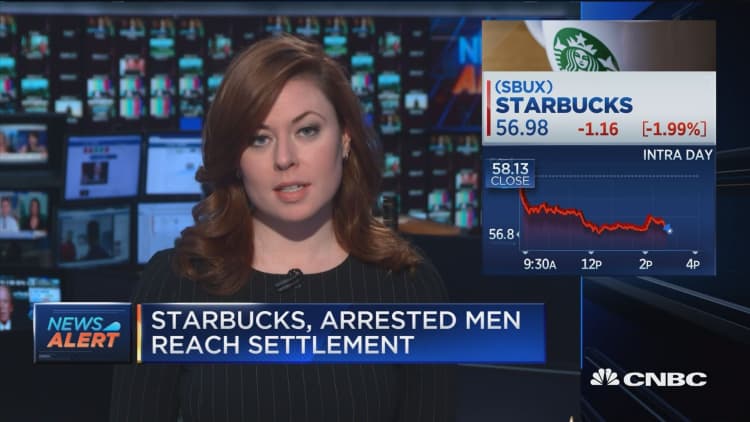Starbucks will need significantly more than an afternoon of training to weed out racial bias among its 175,000 employees, the NAACP Legal Defense and Education Fund said in a report that recommended wide-ranging changes at the Seattle coffee maker.
The company needs to regularly audit its 8,000 stores for racial profiling, update its policy manuals, work with local police and conduct an in-depth "Civil Rights audit" to look at its policies, racial diversity, pay practices and processes, the civil rights group, which has been advising Starbucks, said in a 28-page report released Monday.
It also recommended paying for anti-bias training for police, especially in minority communities where the presence of a Starbucks may contribute to racial tension by gentrifying the neighborhood.
The report was written by Sherrilyn Ifill, president of the NAACP Legal Defense and Education Fund, and Heather McGhee, president of Demos, a public policy organization. The two are advising Starbucks, which announced Monday new in-depth, anti-bias training modules for leaders and baristas, after a Philadelphia store manager ignited public outrage for calling the police on two African-American men who were waiting for a friend April 12.
Starbucks plans to roll out its new training program over the next year with six separate courses for managers and six for employees.
“It’s not solely diversity training,” said Roz Brewer, Starbucks’ chief operating officer.
The first module "Mindful Decision Making" focuses on the impact of discrimination and seeks to help employees make more thoughtful decisions free of bias. The modules will also address engaging with empathy, gratitude and building diverse teams.
While Starbucks won points as an "outlier" in the food and beverage industry for providing benefits to part-time workers, Ifill and McGhee said the company needs to review its pay practices and whether employees are getting enough weekly hours to earn a living wage. They suggested the company correct salary discrepancies, adjust pay higher and respect efforts among workers who want to unionize rank-and-file employees.
"As the company sets new goals for diversity at its corporate headquarters, the leadership must represent a rich mix of people across race if they are to implement the new standards effectively," the report said. "This will require an overhaul of their recruitment practices, hiring protocols and retention-related professional development systems."
Ifill and McGhee said Starbucks should standardize its interview protocols to eliminate any implicit bias and increase the number of racial and ethnic hires across all levels within the organization.
They also urged Starbucks to re-examine its store manual and handbook to correct policies that were "confusing" to employees.
"But as Starbucks has already recognized, its standard Store Operations Manual contains several important omissions," they said. "It includes no guidance on the use of bathrooms, when or if partners should approach customers who don’t purchase products, or when or if law enforcement should be summoned to the store."
Since the incident in Philadelphia, Starbucks has opened its cafes to the public, allowing nonpaying customers to use its cafes and bathrooms. It also provided information about how to address disruptive behaviors without contacting the police and how to contact community resources, such as social services.
Police are only to be called to respond to danger.
“What happened to us shouldn’t happen to anyone,” Donte Robinson, one of the two men arrested in Philadelphia, said in a statement Monday. “While we cannot change the events of April 12th, we are committed to doing what we can to increase opportunities in our community and to prevent other African Americans from being profiled at Starbucks or any other business."
Robinson and Rashon Nelson, the man arrested with him, also recommended that Starbucks sponsor an SAT and college preparation program for public school students in Philadelphia.
Since 2015, Starbucks has hired more than 50,000 people ages 16 to 24 who aren't in school or working, with a goal of hiring 100,000 by 2021. It also has community stores in underserved neighborhoods with rooms available to groups and nonprofits to meet and where local youth can sign up for in-store job skills training programs.
“We want to thank the advisors and all of the people who offered their counsel, recommendations and advice,” Vivek Varma, executive vice president of public affairs for Starbucks, said in a statement Monday. “We’re listening and reflecting. We’re open minded and have more to do.”
Watch: Starbucks settlement includes tuition fees for Philadelphia men

Correction: This article has been updated to clarify that the NAACP Legal Defense and Education Fund issued the Starbucks report.


